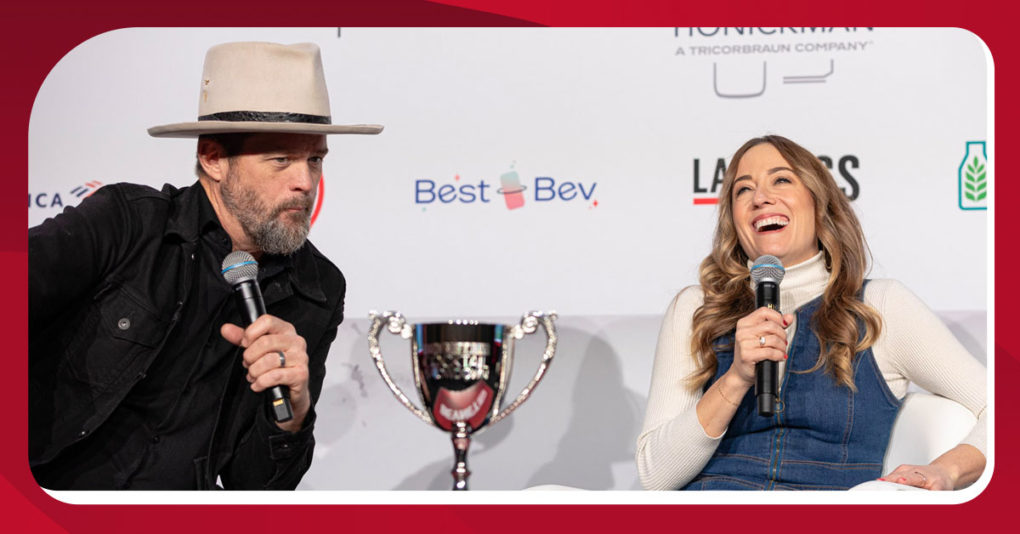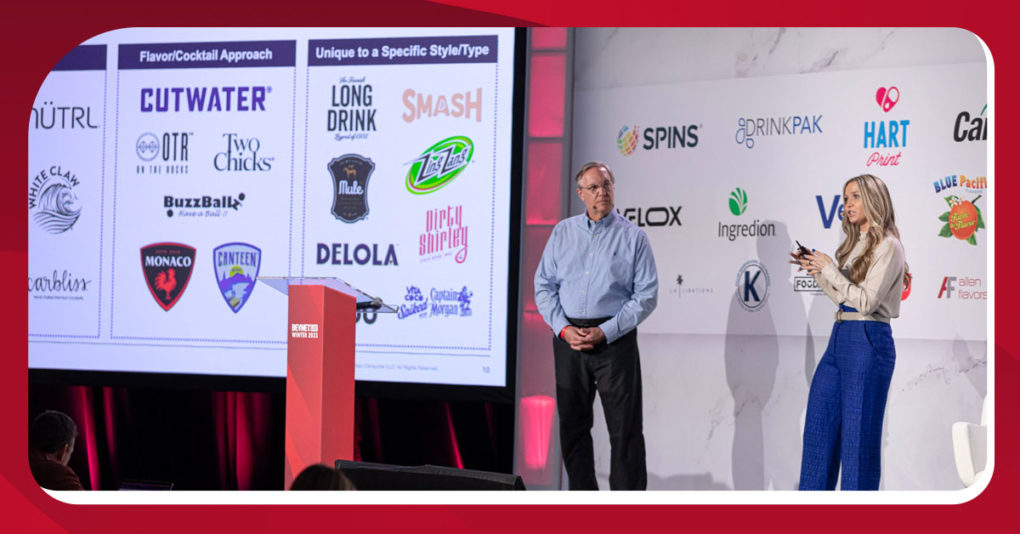The official start to BevNET Live Winter 2023 got going early, with a spirits-themed Sunday afternoon including panels on the state of the RTD cocktail category and a new champion in the annual BevNET Cocktail Showdown.
Ponyboy Slings Takes the Trophy
Ponyboy Slings rode the path to victory during the BevNET Cocktail Showdown in Marina Del Rey, California yesterday.
The Louisville, Kentucky-based RTD bourbon and whiskey spritz line impressed the judging panel with strong original recipes that blend a craft approach to cocktail making with sweet, mainstream-friendly flavor profiles. Founded by husband and wife team Mike and Janell Bass, who are both professional bartenders, Ponyboy Slings lineup includes Bourbon Popstar, Derby Cream Soda and My Cherry Amour varieties which retail for $14.99 per 4-pack and tout 7% ABV per 12 oz. can.
During their pitch, the founders both discussed the brand’s origins during the pandemic and its development up through its launch in July this year. Mike Bass noted that the company is taking a “go narrow, go deep” approach, only targeting its backyard in Kentucky before it looks to expand to other markets, and now has around 50 accounts and has sold over 400 cases with a 90% reorder rate.
“We really want to maximize our sales and marketing efforts in our home state in preparation to scale into neighboring markets like Southern Indiana, Cincinnati and Nashville,” he said.
The judges noted the brand’s easy-to-drink taste and strong branding as reasons behind the brand’s victory. The judging panel included Taylor Cathala, senior category merchant for spirits at Whole Foods; Grace Venus, president of Venus Research and Development; and Taylor Foxman, partner at Alethia Ventures.
“Sipping it, it felt nostalgic,” Cathala said.
Ponyboy Slings beat out a slate of seven other brands, including BTL SVC, DIO, Mission Craft Cocktails, Fresh Fizz Sodas, Good Spirits Cocktails, Tif’s Spiked and Fast Penny Spirits.
Ponyboy Slings is the fourth winner of BevNET’s Cocktail Showdown, joining Velvet Llama, Wandering Barman and Golden Rule as past champions. The company will receive an engraved trophy, an industry advertising package valued at $10,000 and much-treasured bragging rights.
The State of the Category
Prior to the Cocktail Showdown, two stage sessions dove into the state of the burgeoning RTD cocktail market.
First, Kaleigh Theriault, director of thought leadership for beverage alcohol, and Jon Berg, thought leadership VP for beverage alcohol at data firm Nielsen IQ, broke down the current RTD alcohol marketplace, where spirits-based products now represent $1.7 billion in annual retail sales, up by over $500 million since 2022.
Today, Theriault said, spirits-based RTDs are now around a 16% share of the total RTD beverage alcohol set, in particular taking away space from the hard seltzer category.
That’s rapid growth for a category that just a few years ago was barely existent, with just a few brands in the market, she said. Now, there are over 500 brands in the set representing over 2,800 available SKUs – and it’s growing.
With all that growth, the top five brands encompass about 60% of sales, leaving the other hundreds of competitors to fight for the remaining 40%. However, Theriault noted that as the category is still young there’s “room for everybody” as the space grows, develops and consumers become more familiar with their options in the market.
After NielsenIQ, BevNET Spirits Editor Ferron Salniker sat down with Taylor Foxman and 99 Proof Partners founding partner Mike Solow to discuss the state of investment in the spirits industry.
As many alcohol brands have shown “crazy” valuations in recent years, Solow said that investors have “a lot of options” at the moment in the space despite some overall hesitancy last year from investors across industries. As the spirits category has grown over recent years and more brands have entered the category, much of Foxman and Solow’s advice for entrepreneurs raising money rings true across categories: show that your brand can stand out and your business is sound.
“Truthfully, it is a pretty competitive environment out there,” he said. “It’s not that the capital is drying up, it’s just you have to be very clear … and you’ve got to come very correct, dialed-in with your pitch and know what you’re up against.”
Foxman recommended brands that focus on specific communities, or regional plays, can be appealing for some investors. She touted brands that target niche audiences can develop powerful loyalty that makes them a strong potential investment.
“It’s really important given how saturated the market is to be able to find your audience and really hone in on that and just really think about what community means,” Foxman said. “I think making it something that could be applicable to you, whether it’s maybe something regionally based, whether it’s the demographic of people that try your product, I just love the idea of community and I think people could really lean into that and use that.”

